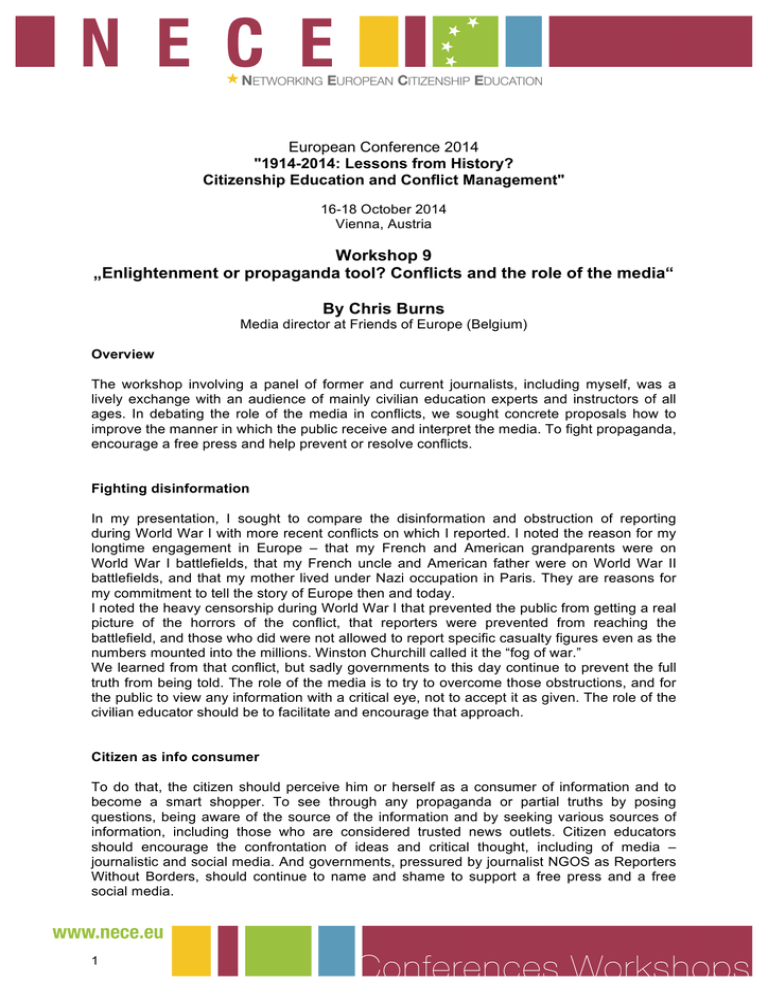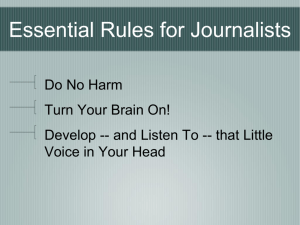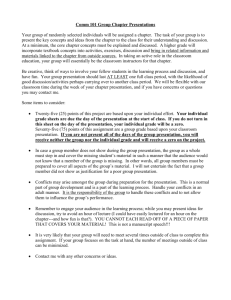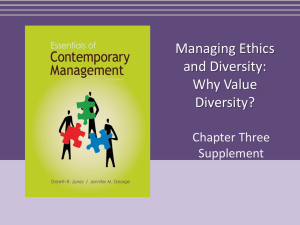Document 13157258
advertisement

European Conference 2014 "1914-2014: Lessons from History? Citizenship Education and Conflict Management" 16-18 October 2014 Vienna, Austria Workshop 9 „Enlightenment or propaganda tool? Conflicts and the role of the media“ By Chris Burns Media director at Friends of Europe (Belgium) Overview The workshop involving a panel of former and current journalists, including myself, was a lively exchange with an audience of mainly civilian education experts and instructors of all ages. In debating the role of the media in conflicts, we sought concrete proposals how to improve the manner in which the public receive and interpret the media. To fight propaganda, encourage a free press and help prevent or resolve conflicts. Fighting disinformation In my presentation, I sought to compare the disinformation and obstruction of reporting during World War I with more recent conflicts on which I reported. I noted the reason for my longtime engagement in Europe – that my French and American grandparents were on World War I battlefields, that my French uncle and American father were on World War II battlefields, and that my mother lived under Nazi occupation in Paris. They are reasons for my commitment to tell the story of Europe then and today. I noted the heavy censorship during World War I that prevented the public from getting a real picture of the horrors of the conflict, that reporters were prevented from reaching the battlefield, and those who did were not allowed to report specific casualty figures even as the numbers mounted into the millions. Winston Churchill called it the “fog of war.” We learned from that conflict, but sadly governments to this day continue to prevent the full truth from being told. The role of the media is to try to overcome those obstructions, and for the public to view any information with a critical eye, not to accept it as given. The role of the civilian educator should be to facilitate and encourage that approach. Citizen as info consumer To do that, the citizen should perceive him or herself as a consumer of information and to become a smart shopper. To see through any propaganda or partial truths by posing questions, being aware of the source of the information and by seeking various sources of information, including those who are considered trusted news outlets. Citizen educators should encourage the confrontation of ideas and critical thought, including of media – journalistic and social media. And governments, pressured by journalist NGOS as Reporters Without Borders, should continue to name and shame to support a free press and a free social media. 1 The news cycle Fast forward to contemporary times, and the conflicts on which I reported. I noted the pressures a journalist faces these days, with constant deadlines and various news platforms to feed – TV, radio, print, online – sometimes every half hour. Editors seeking to compete with other news outlets are demanding a strong and vivid report as soon as possible, and live broadcasts sometimes around the clock if in a crisis situation. In that context, a journalist enters a conflict situation with the immediate pressure to survive from the elements, the bullets, unruly checkpoints, and the otherwise unpredictable. To try to interview people in the middle of the conflict and get at least a part of the story. No one report should be expected to tell the whole story. That’s why news consumers should depend on more than one news source. Civil educators should help make the public aware of that. Case studies In Rwanda, Radio Mille Collines fanned the flames of fear and hatred among the Hutus against the Tutsis, setting the stage for the genocide I reported on. In Kosovo I was a victim of Serb propaganda the night before the NATO air strikes, when Serb TV broadcast clips of my reports on CNN and called me a factory of lies. I was forced to evacuate or face the danger of being lynched – the Serb press spokesman in Pristina telling me he could “not guarantee my security.” And there’s the added element of how the conflict is perceived back home. Going to Afghanistan, I saw US TV channels flying the American flag after September 11. As in other recent conflicts involving US troops, criticizing the war effort was seen by many as putting US troops in danger. Journalists were under pressure not to undermine the war effort, though that did not stop some journalists from posing questions. With the second Iraqi conflict, the Bush administration stressed doubts about the intentions of Saddam Hussein to justify the war. White House spokesman Ari Fleischer skilfully rebuffed journalists’ questions, as I witnessed as a CNN White House correspondent at the time. In addition, journalists were embedded among the troops, making it difficult to report the other, often more dangerous, side. Reporting on the Israel-Palestine conflict, criticism of the reporting came from both sides. My CNN reports from Gaza were seen by some Israelis as pro-Palestinian, and vice-versa. Editing on the AP international desk during the first intifada, I and other colleagues reckoned that since we were getting roughly the same number of angry calls from both sides, we were balanced in our reporting. The info explosion One factor involving all recent conflicts is the information explosion – that the public is bombarded by information from all sides, on TV, radio, in newspapers and online. Euronews is an example of seeking neutrality, as member governments include both Ukraine and Russia. The info explosion gives civilian education an even more critical role. The public must consider where the information is coming from, what political orientation it has, how it’s funded. What kind of language or terminology does it use? One person’s terrorist can be another’s freedom fighter. One’s liberation may be another’s invasion. The info explosion has also had its victims in the media, undermining established news outlets struggling to monetise their content while a fickle public surf around for free news. As a result, established news organisations are forced to shrink their staff and coverage, leaving an information gap. Interest groups in turn try to fill the gap with their own communications 2 staff producing one-sided content with an agenda. The public must be sensitised to these developments, giving all the more reason to read, view and listen with critical eyes and ears. One example is in Brussels, where the EU press corps shrank from 1,200 to about 800 in five years, In a city with news for 28 member countries, news outlets are usually short-staffed, and interest groups and PR agencies seek to fill the info gap. Proposals My proposals called for a more activist approach to educating the citizen and fighting disinformation, with the hope of preventing the next potential conflict: § Citizen education: should be pre-emptive, encouraging a critical view and to seek information from a variety of news sources. To analyse and compare different reports from different news outlets as well as social media. In conflict, it can be a part of the mediation. Afterwards, it could be part of the healing. § Engagement and activism: Encourage students to engage with news reports, offering their commentary online. Students could also become involved in groups that defend or promote a cause they hold dear. § Monetise the media: Teach students that reliable news organisations cost money, and that for relatively little money, they could support one or more news outlets of their choice. Crowd funding is another option. § Media training: for local journalists and officials involved in conflict zones, it could help them to avoid fanning the flames. Use realistic scenarios to prepare for eventual crises. § Teacher training: Instruct teachers how to encourage youth to take a more critical view of the media, to become a smart consumer of information. It should also be a two-way street: that educators and the students should exchange information, as in some cases students may know more than do the educators about online media. § History books: Step up efforts to write a common history between former foes. In existing conflicts, UNESCO or other could fund rewriting history books that aggravate those conflicts. § Watchdogs: Organisations like Reporters Without Borders and their press freedom surveys can name and shame countries on the basis of press freedom of a lack of it. Watchdog groups can also fact check news and report blaring errors, or intentional propaganda. Conclusion As the public is bombarded by a wide variety of news and information, civilian education can play a highly important role in helping the public make sense of it all and to avoid becoming victims of propaganda, pandering and disinformation. Training the public, educators, officials and reporters could help prevent the next conflict, or aid in post-conflict healing. It’s a kind of soft power that world powers should highly value and fund accordingly. 3




